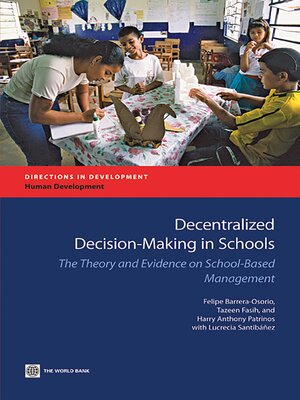Decentralized Decision-Making in Schools
ebook ∣ The Theory and Evidence on School-Based Management · Directions in Development: Human Development
By Felipe Barrera-Osorio

Sign up to save your library
With an OverDrive account, you can save your favorite libraries for at-a-glance information about availability. Find out more about OverDrive accounts.
Find this title in Libby, the library reading app by OverDrive.



Search for a digital library with this title
Title found at these libraries:
| Library Name | Distance |
|---|---|
| Loading... |
Are school-based management reforms improving education? This book analyzes the theory and evidence behind decentralized decision-making in schools worldwide.
Decentralized Decision-Making in Schools explores the impact of school-based management (SBM) reforms across diverse countries. It examines how empowering principals and teachers, and strengthening parental involvement, affects educational outcomes. The authors review over 20 country experiences, providing insights into the effectiveness of SBM in various contexts. - Discover the key factors for successful SBM implementation.
- Understand the impact of SBM on student achievement and attendance.
- Learn how to design effective education projects with decentralized authority.
This insightful analysis is for education officials, policymakers, and researchers seeking evidence-based strategies for improving school governance and student outcomes.







